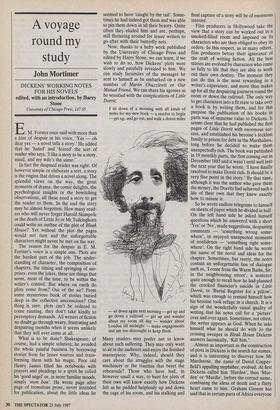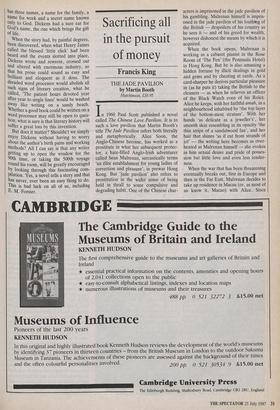A voyage round my study
John Mortimer
DICKENS' WORKING NOTES FOR HIS NOVELS edited, with an introduction, by Harry Stone
University of Chicago Press, £47.95
E. M. Forster once said with more than a hint of despair in his voice, 'Yes — oh dear yes — a novel tells a story.' He added that he 'hated' and 'feared' the sort of reader who says, 'Hike a story to be a story, mind, and my wife's the same.'
In fact the despised reader was right. Of however simple or elaborate a sort, a story is the engine that drives a novel along. The splendid views on the way, the great moments of drama, the comic delights, the psychological insights or the bewitching observations, all these need a story to get the reader to them. In the end the story may be almost forgotten. How many read- ers who will never forget Harold Skimpole or the death of Little Jo or Mr Tulkinghorn could write an outline of the plot of Bleak House? Yet without the plot the pages would not turn and the unforgettable characters might never be met on the way.
The reason for the despair in E. M. Forster's voice is a simple one. Plots are the hardest part of the job. The under- standing of character, the composition of chapters, the timing and springing of sur- prises, even the jokes, these are things that seem, most of the time, to be within the writer's control. But where on earth do plots come from? Out of the air? From some mysterious book of stories buried deep in the collective unconscious? One thing is sure, plots can't be ordered to come running, they don't take kindly to peremptory demands. All writers of fiction no doubt go through weary, frustrating and despairing months when it seems unlikely that they will ever come at all.
What is to be done? Shakespeare, of course, had a simple solution; he avoided the whole painful business by borrowing stories from far lesser sources and trans- forming them with his magic. Poor old Henry James filled his notebooks with prayers and pleadings to a spirit he called his 'good angel' or, in more familiar moods, simply `mon bon'. He wrote page after page of tremulous prose, never intended for publication, about the little ideas he seemed to have 'caught by the tail'. Some- times he had indeed got them and was able to pin them down in all their beauty. Quite often they eluded him and are, perhaps, still fluttering around for lesser writers to go after with their butterfly nets.
Now, thanks to a hefty work published by the University of Chicago Press and edited by Harry Stone, we can learn, if we wish to do so, how Dickens' plots were slowly and painfully revealed to him. We can study facsimiles of the messages he sent to himself as he embarked on a new number of Martin Chuzzlewit or Our Mutual Friend. We can share his agonies as he wrestled with the complications of Little Dorrit:
I sit down of a morning with all kinds of notes for my new book — a resolve to begin —get up, and go out, and walk a dozen miles — sit down again next morning — get up and go down a railroad — get up and wander about my room all day — wander about London till midnight — make engagements and am too distraught to keep them.
Many readers may prefer not to know about such suffering. They may only want to sit in the audience and enjoy the finished masterpiece. Why, indeed, should they care about the struggles with the stage machinery or the traumas that beset the rehearsals? Those who have had, in however small a way, to hunt for plots of their own will know exactly how Dickens felt as he padded helplessly up and down the cage of his room, and his stalking and final capture of a story will be of enormous interest.
Film producers in Hollywood take the view that a story can be worked out in a smoked-filled room and imposed on its characters who are then obliged to obey its orders. In this respect, as in many others, film producers betray their ignorance of the craft of writing fiction. All the best stories are evolved by characters who come so fully to life that they are able to work out their own destiny. The moment they can do this is the most rewarding in a writer's experience, and more than makes up for all the despairing journeys round the room or down the railroad. The only way to get characters into a fit state to take over a book is by writing them, and for this purpose the publication of his books in parts was of immense value to Dickens. It seems clear that he had published the first pages of Little Dorrit with enormous suc- cess, and established his heroine's feckless family in prison for debt in the Marshalsea, long before he decided to make them unexpectedly rich. The book was published in 19 monthly parts, the first coming out in December 1885 and it wasn't until well into the next year that he wrote, 'I have finally resolved to make Dorrit rich. It should be a very fine point in the story.' By that time, although it was the author who gave them the money, the Don-its had achieved such a life of their own that they knew exactly how to misuse it.
So he wrote endless telegrams to himself on sheets of paper which he divided in half. On the left hand side he asked himself questions which he answered with a short `Yes' or 'No', made suggestions, despairing comments — 'something wrong some- where', or enjoyed unexpected moments of confidence — 'something right some- where'. On the right hand side he wrote the name of the novel and ideas for the chapter. Sometimes, but rarely, the notes contain an unforgettable line of dialogue such as, 'I come from the Warm Baths, Sir, in the neighbouring street', a sentence quite enough to recall how he had planned the crooked financier's suicide in Little Dorrit, or `Burial Register for a pillow', which was enough to remind himself how his heroine took refuge in a church. It is a sign of the wonderfully visual quality of writing that his notes call for a 'picture' over and over again. Sometimes, not often, the writer appears as God. When he asks himself what he should do with Jo the crossing sweeper in Bleak House Dickens answers laconically, `Kill him.'
Almost as important as the construction of plots in Dickens is the search for names, and it is interesting to discover how Mr Murdstone, the name of David Copper- field's appalling stepfather, evolved. At first Dickens called him 'Harden', then `Mur- den' or `Murdle', before the correct name, combining the ideas of death and a flinty heart came to him. Graham Greene has said that in certain parts of Africa everyone has three names, a name for the family, a name for work and a secret name known only to God. Dickens had a sure ear for God's name, the one which brings the gift of life.
When the story had, by painful degrees, been discovered, when what Henry James called the blessed 'little click' had been heard and the events slotted into place, Dickens wrote and rewrote, crossed out and altered with enormous industry, so that his prose could sound as easy and brilliant and eloquent as it does. The dreaded word processor would abolish all such signs of literary creation, what he called, 'The patient hours devoted year after year to single lines' would be washed away like writing on a sandy beach. Whether a good book could be written on a word processor may still be open to ques- tion; what is sure is that literary history will suffer a great loss by this invention. But does it matter? Shouldn't we simply enjoy Dickens without having to worry about the author's birth pains and working methods? All I can say is that any writer getting up to open the window for the 90th time, or taking the 500th voyage round his room, will be greatly encouraged by looking through this fascinating com- pilation. Yes, a novel tells a story and that has never, ever been an easy thing to do. This is bad luck on all of us, including E. M. Forster.



















































 Previous page
Previous page